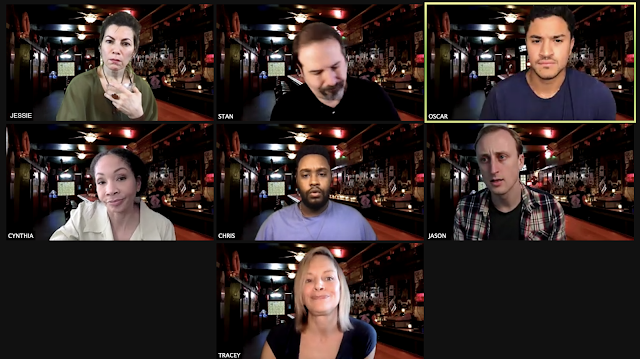Review: "Sweat" Exposes the Blood and Tears of a Factory Town
Sweat
Written by Lynn Nottage
Directed by Brandon Walker
Presented by The Seeing Place Theater
Live via Zoom February 27-28, 2021
Streaming via YouTube February 28-March 3, 2021
 |
| The cast of Sweat. Image courtesy Kampfire PR |
The majority of Sweat unfolds in flashback to 2000 from the play's framing present day of 2008, with brief bursts of news headlines between scenes to provide real-world context (causing one to note, for instance, the consistent propensity of the government to prop up Wall Street with infusions of bailout money). The scenes in 2000 take place almost entirely inside a neighborhood bar in Reading, Pennsylvania, and those who congregate there are almost all currently or formerly employed by the local factory. The bartender is Stan (David Nikolas), who worked at the plant, like his father and grandfather before him, until he was injured on the job. Cynthia (Joy Sudduth) and Tracey (Lori Kee), friends since childhood, still work there, as do their respective sons, Chris (Justin Phillips) and Jason (Logan Keeler), who are also friends—although Chris's harboring of ambitions beyond the plant causes some friction. Cynthia's estranged husband Brucie (Philipe D. Preston), another former plant employee, is struggling with drug use, and Jessie (Eileen Weisinger), another friend of the group, balances her hard work at the plant with hard drinking at the bar. Busboy Oscar (Juanes Montoya), with his Columbian heritage and having never been able to get a job at the plant, is an outsider in multiple ways. Cynthia and Tracey both apply for the same promotion, hoping to make the vanishingly rare transition from the floor into management; the repercussions eventually carry through into and exacerbate tensions caused by changes at the plant, a place that Stan had previously asserted never changed. Ultimately, there will be a parole officer (Miguel Alejandro Faña) involved.
 |
| Logan Keeler and Miguel Alejandro Faña. Image courtesy Kampfire PR |
 |
| Lori Kee and Juanes Montoya. Image courtesy Kampfire PR |
The excellent cast absorbingly conveys the intensities of the working-class Americans' relationships, anxieties, and struggles while humanizing without shying away from their characters' rougher edges. Nikolas's terrific turn as Stan acts as the fulcrum for much of the play, and just about everyone else gets a stand-out scene at some point, such as Kee and Montoya in a scene in which Oscar upends Tracey's certainties while they share cigarettes outside the bar, Weisinger's Jessie looking back at an 18 year-old self who planned to see the world, and Montoya's Oscar expounding on why he would cross a picket line. The performances are followed by a short talkback; and at the performance which we attended, the artists addressed questions about rehearsing and acting online, the continued relevance of the play, whether this hybrid form of live virtual theater will stick around in the future, working with the character Jason's face tattoos, and more. The Seeing Place's Sweat has a limited run, so see it before it evaporates like the illusion of a factory's loyalty to its employees.
-John R. Ziegler and Leah Richards



Comments
Post a Comment